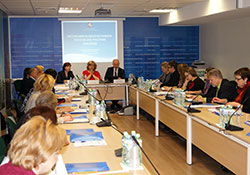Lithuania hosts policy dialogue on child maltreatment prevention

Ministry of Health, Lithuania
The Lithuanian Ministry of Health recently partnered with the WHO Regional Office for Europe to host a multisectoral policy dialogue on child maltreatment prevention. The policy dialogue brought 30 stakeholders together to collaborate on a joint revised policy proposal that builds on the current Lithuanian Violence Prevention and Protection Programme for Children 2010-2015.
At the workshop, Dr Robertas Povilaitis and Deputy Minister of Social Affairs and Labour Mr Algirdas Seselgis presented an assessment of current policy and practice on child maltreatment in Lithuania. After a lengthy discussion, participants agreed that in order to reduce child maltreatment, there is a need to enact:
- better governance mechanisms to enhance cross-sectoral collaboration and information sharing;
- uptake of the module of child maltreatment in periodic community surveys and surveys on health behaviour in school-aged children;
- a greater emphasis on the implementation of health visitation and parenting programmes among the health systems workforce;
- stronger multisectoral collaboration;
- a review of the law on corporal punishment; and
- social marketing campaigns to change social attitudes towards violence and promote positive parenting techniques.
WHO supports Lithuania in moving forward
With the help of WHO, Lithuania is working to integrate the European child maltreatment prevention action plan into its revised policy proposal. The honourable Ms Rimante Salaseviciute has reaffirmed her commitment to investing in children, and the importance of science-based multisectoral action, as laid out in the European child maltreatment prevention action plan. At the workshop, Dr Dinesh Sethi described ways in which WHO supports Member States in its implementation, calling for surveillance, policy development, and the implementation of prevention programmes to reduce child maltreatment.
As a direct outcome of the workshop, a report on the policy dialogue will be presented to ministers from relevant agencies, and guidance on how to best implement strategies outlined in the European child maltreatment action plan is being developed for dissemination to stakeholders in 2015. The final proposed revisions of the policy will be presented to Parliament.



